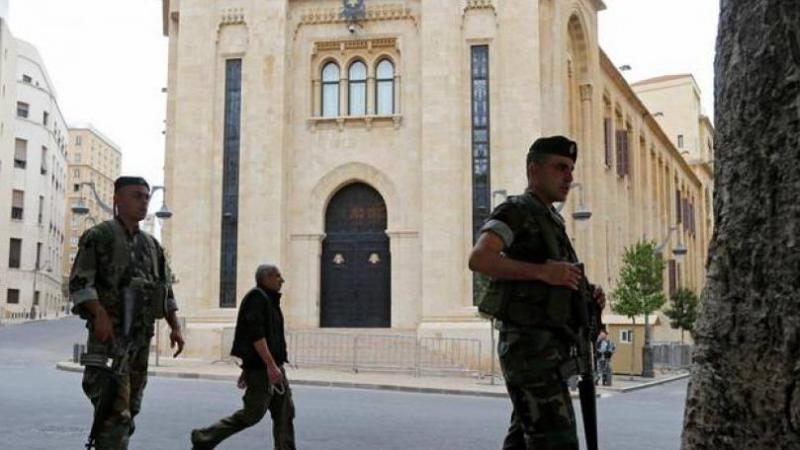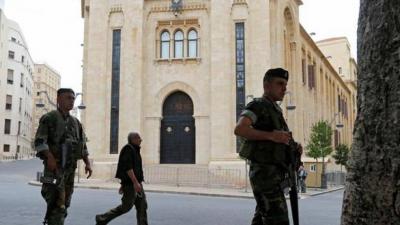The parliamentary blocs adhered to the scenario they had prepared for themselves during the first session dedicated to electing a president for the republic, which ended with an extension of sessions, allowing the parliamentary speaker Nabih Berri to set the date for the second election session, conditional on consensus on a president. However, the election session that concluded without achieving the presidential entitlement 32 days before Michel Aoun's presidential term ends highlighted several political facts, most notably the continued fragmentation among Sunni MPs who are divided due to the absence of a maestro capable of uniting the majority into a single parliamentary bloc, following the political references' reluctance to engage in the parliamentary elections, leading to a vacuum in the parliament. Efforts aimed at consolidating the Sunni situation have not succeeded in compensating for their absence.
In this context, "Asharq Al-Awsat" learned that 26 MPs belonging to the Sunni sect participated in the first election session, with the absence of Ibrahim Mneimneh, a member of the "Change Forces" bloc, who had to stay home due to a "Corona" infection. Notably, the largest number among them voted on a paper inscribed with the name "Lebanon," while the others dispersed into several groups and voted via blank papers, in solidarity with the Shiite duo, except for Ashraf Rifi, Bilal Abdullah, and Bilal Hashimi, who voted for candidate Michel Moawad, in contrast to Halima Al-Qaqour, Waddah Al-Sadiq, Yassine Yassine, and Rami Fanj, who voted for his rival Selim Michel Edde.
The votes cast by the MPs within the "Change Forces" bloc for Edde unexpectedly surprised many; they voted for him instead of their nominee, former MP Salah Edward Haneen, to avoid division regarding his candidacy between a faction insisting on supporting him and another that prefers not to back him, arguing that he belongs to the political establishment. A source close to the "Change Forces" pointed out that 9 of its members insisted on nominating Haneen against 2 opposing, namely Firas Hamdan and Halima Al-Qaqour, while Mneimneh and his colleague Cynthia Zarazir stipulated the need to unify their stance, asserting they had no objection to supporting Haneen as long as consensus on his candidacy was reached, although Mneimneh was the first to nominate him.
The consensus of 11 MPs in supporting Edde at the suggestion of Melhem Khalaf, excluding Mneimneh who did not attend the session and his colleague Najat Saliba Aoun who apologized for her absence, focused on the effort to unify their position so as not to let discrepancies threaten the unity of the "Change Forces" bloc. The same source revealed that Edde's name was on the list of presidential candidates the bloc prepared, alongside Haneen and former ministers Ziyad Baroud, Nasif Hitti, former ambassador Naji Bouassi, and Karim Emil Bitar, although priority was given to Haneen's candidacy as it posed a dilemma for the "Progressive Socialist Party" and "Democratic Gathering," since he was elected as a deputy running on the list supported by Walid Jumblatt.
The source saw that withdrawing support for Haneen's candidacy was unjustified, stating it was due to a desire to maintain unity within the bloc in light of Al-Qaqour's insistence on choosing a candidate for the presidency outside the political alignments. He noted that the bloc now faces a challenge to affirm its cohesion in the second election session, especially since the majority seems inclined to adopt Moawad's candidacy should he decide to continue his presidential bid, which poses a dilemma for Al-Qaqour and her supporters; as they are out of sync with the group, decisions can no longer be made unanimously. The bloc had previously raised the issue of voting in absence of consensus during its last retreat.
As for the Sunni MPs, they still appear to be in a state of confusion, unlike deputies belonging to other sects, not only because the resistance axis has a share of Sunni representation ranging between 7 and 9 deputies but also due to the majority's inability to unify its stance. They often react to the issues at hand, stemming from a lack of coordination and the presence of ambitious parliamentary leaders competing to inherit absent Sunni political references.
On the other hand, the Shiite duo and their allies decided to vote with blank papers against the opposing majorities supporting Moawad's candidacy, despite the latter lacking support from the vast majority of Sunni MPs, starting with the largest number from the North, through Beirut, and ending with Bekaa and Sidon, where Osama Saad and Abdul Rahman Al-Bizri voted with blank papers.
The only option for the Shiite duo and their allies was to vote with blank papers in an attempt to distract from their inability to unify their position to compete with a single candidate; that is, Sleiman Frangieh, who is considered the strongest candidate, since Gebran Bassil, the head of the "Free Patriotic Movement," stands firmly opposing support for him. This step aimed to delay the political explosion between their antagonistic allies, hoping their ally "Hezbollah" might attempt a new effort to mend the rift. This situation also applies to the opposing majorities, which are now faced with a tough task requiring them to start unifying their ranks by opening a dialogue with the "Change Forces" and another with Sunni MPs, specifically those who voted using papers that included the name Lebanon.
Therefore, calling the MPs for a second election session faces difficulties unless the conditions set by Berri to specify a new session date are met. This implies that the possibility of reviving the caretaker government remains the most likely in the foreseeable future. This is what "Hezbollah" relies on, which understands, as a ministerial source told "Asharq Al-Awsat," the position of President Najib Mikati and does not support the conditions of his ally Aoun, who adopts Bassil's viewpoint demanding the exclusion of some ministers affiliated with his political team whom he accuses of abandoning him in favor of Mikati.
The ministerial source confirmed that Mikati maintains his position and will not yield to intimidation and threats, especially after being surprised by new conditions from Aoun contrary to what he previously agreed upon before heading to New York. He stated he would not back down, while a political source saw that "Hezbollah" insists on forming a government to manage the presidential vacancy for two reasons: first, its unwillingness to agree on a consensus president; and second, due to its assessment that the balance of power in parliament would not permit the appointment of a president similar to Aoun.
The question remains: How long will the disarray among Sunni MPs continue? This makes Sunni influence ineffective, even though it is a fundamental component in the country's structure and political equation, holding the position of the prime ministry. This was confirmed in yesterday's session and in previous sessions of the parliament elected on May 15, and the continuation of the situation as is robs them of a role in the reconstitution of political power with the election of a new president that continues to falter and may enter into an extended hiatus.




